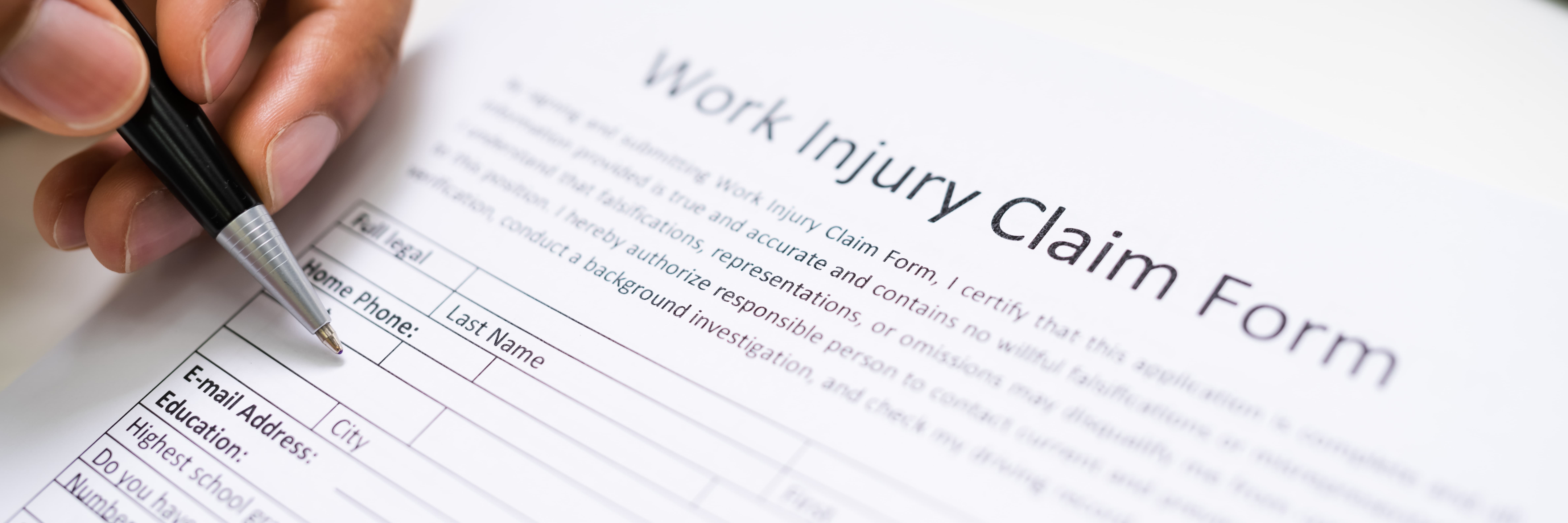What Is the Process When Filing for Workers Compensation?
When you have a work injury, workers’ compensation can provide welcome relief. However, you must take the proper steps to receive your benefits.

Our experienced workers’ compensation attorneys know the mistakes people make when they file for workers’ compensation. We want you to understand what you need to do to receive the benefits you’ve earned.
What should I do after an accident at work?
Getting injured in an accident at work can happen suddenly and without warning. Knowing what to do following an injury is crucial, especially if you plan to file for workers’ compensation to get the help you need and return to work. If you get injured on the job, you should:
- Assess the injury and call 911 if necessary
- Tell your manager
- Make an accident report
- Collect evidence and take photos
What is the employer’s responsibility when a worker is injured?
If you get injured on the job, your employer is responsible for taking action. They should:
- Attempt to avoid workplace injury by providing a safe place to work
- If an employee is injured, the employer should make an accident report
- Ensure that all injured worker employee rights and workers’ compensation laws are followed
- If medical treatment is required, allow them to see a company doctor or their own doctor for medical assessment
How long after a work accident can I claim?
The time you have after a work accident to make a claim varies by state. In Colorado, a workers’ compensation claim must be made within two years of an injury. You should notify your employer within four days of an injury or as soon as possible.
Steps for filing workers’ compensation in Colorado

1. Get Medical Attention
The process for filing workers’ compensation in Colorado doesn’t start with filing paperwork. The first thing to do is to get medical care for your injuries. The right way to get medical care depends on whether your injuries constitute an emergency.
Emergency
For cases involving emergency medical care, get medical help as fast as you can. You may go to the nearest hospital or care provider. The employer doesn’t have to approve the provider. After all, there is no time to wait.
Non-Emergency
Your employer should give you a list of approved healthcare providers if it’s not an emergency. You may choose one from the list and seek medical care. The employer should give you at least four options for doctors for your medical care.
2. Notify the Employer
To receive benefits, your employer needs to know that you are injured. Your notice should be:
- Made as soon as possible, but not more than four days after the injury
- Given in writing
Even if it’s been more than four days, report your injury. If the report is late, the employer may use the delay to reduce compensation.
3. File Your Claim
File Form WC-15 with the Colorado Department of Labor and Employment Division of Workers’ Compensation. The form is a claim for benefits and compensation. By submitting the form, you’re stating that you were injured and deserve benefits.
Where do I send my Colorado workers’ compensation form?
Send or deliver two completed copies of your Colorado workers’ compensation form to: Colorado Division of Workers’ Compensation
Customer Service Unit
633 17th St., Suite 400
Denver, CO 80202-3626
Even if your employer didn’t have workers’ compensation insurance, you should still file because you may receive benefits through the Colorado Uninsured Employer (CUE) fund.
4. Wait for the Decision
Once you file Form WC-15, insurance companies generally have 20 days to issue a decision about your benefits. They may accept or deny the claim. They may also accept your claim but make a determination of benefits that you disagree with.
5. Evaluate Your Benefits
Once you have the determination back from the insurance company, you need to decide what to do next. In order to choose whether to accept what the insurance company says or contest it, you need to know if they correctly decided your benefits.
- First, your medical care should be covered. It should continue until you reach the Maximum Medical Improvement for your injuries.
- Second, if you cannot work for three or more days, you should receive temporary total disability or temporary partial disability payments. These payments should be calculated accurately based on your average weekly wage. (Offsets may apply.)
- Third, you should receive any disfigurement compensation that you deserve under the law. An experienced workers’ compensation attorney can help you evaluate the determination in your case.
Did you know mileage and parking can be reimbursed?
You may know the basics about what’s covered, but the details can make a big difference. For example, in addition to fully paid medical care, you may also be reimbursed for mileage and parking. Even mileage and parking for getting prescriptions and other supplies can be reimbursed.
For reimbursement, you must make the request within 120 days of when you incur the expense. Once you submit your claim, the insurance company has 30 days to pay it. The Division of Workers’ Compensation provides a sample reimbursement form.
6. Receive Your Benefits or Request a Hearing
Once a determination is made, you have the choice to agree and receive your benefits or disagree and request a hearing. Here are the steps to take:
Agree
When you agree with the determination of benefits, continue to receive your medical care and collect your benefits. The insurer will file the final paperwork within 30 days of your reaching maximum medical improvement. You have 30 days to object to the final paperwork if you disagree. Be sure to review any determination of permanent disability and the associated payment.
Disagree
When the insurance company denies liability, or if you disagree with their determination, you may request a hearing. Request an expedited hearing for compensability and medical coverage issues. You’ll have a hearing within 60 days. An expedited hearing must be requested within 45 days of the denial. Request a standard hearing for a hearing on any issue that’s part of the claim. You’ll have a hearing within 120 days.
What happens at a workers’ comp hearing?
A workers’ compensation hearing is held before an Administrative Law Judge. You may present evidence and question witnesses. You may have an attorney represent you at your hearing and throughout your entire workers’ compensation claim. Some hearings are short – about 30 minutes – but a hearing may last several days. The insurance company will almost certainly have an attorney representing them.
7. Appealing a workers’ compensation hearing
The judge issues their decision within 15 days of the hearing. If you want to appeal it further, you have 20 days to file a Petition to Review. There are several steps to follow for appeals, including filing the petition, requesting a transcript, and submitting a brief to make your arguments. The Industrial Claim Appeals Panel issues a decision. From there, you may appeal further to the Colorado Court of Appeals.
How can an attorney help me with the process of filing for workers’ compensation?

A personal injury attorney can help you with the entire process of filing for workers’ compensation. There are many procedural steps to follow and things to look for. They know how to preserve your rights and advance your claim. An experienced workers’ comp attorney can evaluate decisions to see if you receive the correct benefits. With their guidance, you can take the proper steps to receive the compensation you deserve.
Attorneys for Filing Workers’ Compensation
If you need help filing for workers’ compensation, a personal injury case, or a medical malpractice claim, we are here to help.
Our workers’ comp lawyers want you to receive the benefits you deserve and can help you appeal a decision. Contact us today for a free consultation.
Sources:
Colorado Uninsured Employer Fund. Colorado Department of Labor and Employment.
Forms. Colorado Department of Labor and Employment.
Handling a Claim: Employer and Employee Responsibilities (23 July 2019) FindLaw.
Injured Workers. Colorado Department of Labor and Employment.
Workers’ Compensation. Colorado Office of Administrative Courts.






